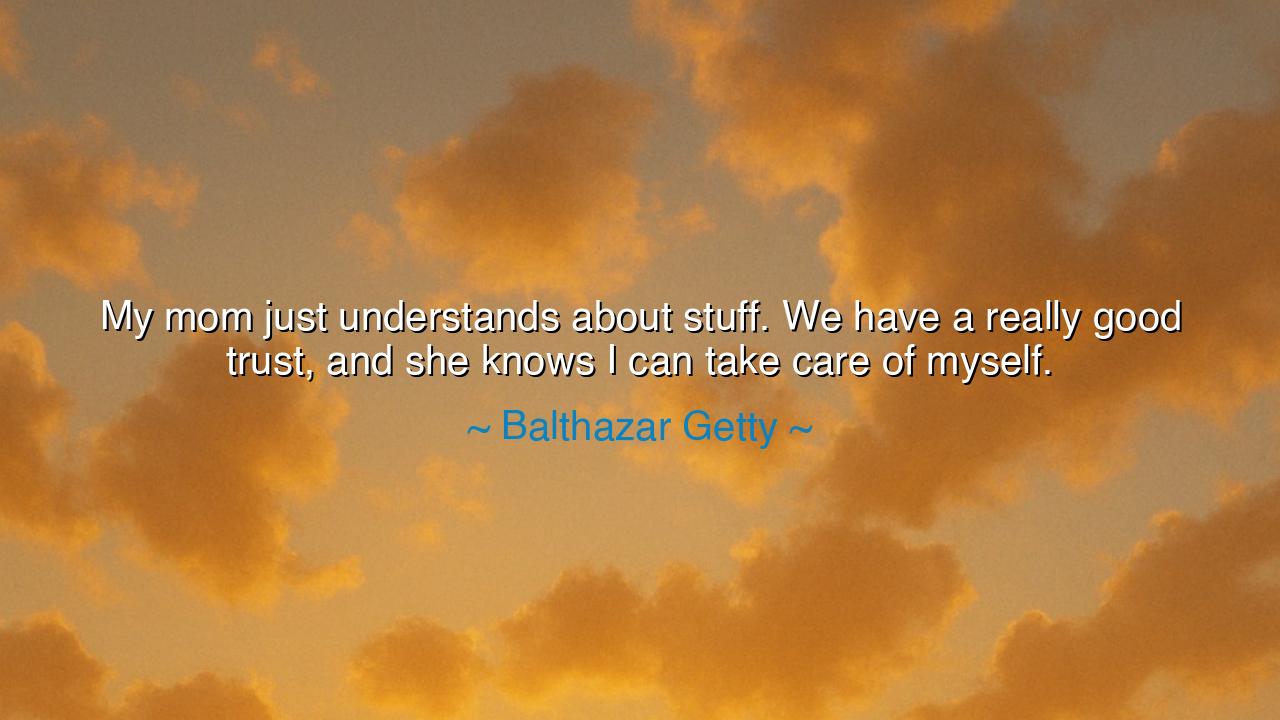
My mom just understands about stuff. We have a really good trust
My mom just understands about stuff. We have a really good trust, and she knows I can take care of myself.






Hearken, children of reflection, to the words of Balthazar Getty, who shares: "My mom just understands about stuff. We have a really good trust, and she knows I can take care of myself." In these simple words lies a profound truth, one that resonates across generations: the bond between parent and child is not merely one of authority or instruction, but of mutual recognition, of confidence in the heart and wisdom of another. Since the earliest ages, the ancients have recognized that the foundation of family is built upon trust, understanding, and respect.
The ancients spoke often of the sacred role of a mother—not only as nurturer, but as guide, counselor, and confidant. Cicero, reflecting on familial bonds, wrote that the highest form of love between parent and child is grounded in both guidance and faith: to understand another is to perceive not just their actions, but their capacity, their discernment, and their moral compass. Getty’s words reflect this timeless insight: his mother’s understanding allows him the freedom to act while still being supported by her wisdom.
Consider the story of Marcus Aurelius and his mother, Domitia Lucilla, who nurtured in him a sense of moral fortitude, self-reliance, and ethical reflection. She recognized his capacity to take care of himself, yet her presence provided the assurance and trust that made him capable of facing the burdens of empire. Like Getty, he thrived not because of blind obedience, but because of the understanding and confidence instilled in him by a parent who trusted his judgment and respected his autonomy.
The quote also highlights a crucial aspect of human growth: the delicate balance between protection and freedom. To truly care for another is not merely to shield them from harm, but to nurture the skills and judgment necessary to navigate the world independently. Getty’s recognition of his mother’s faith in his abilities mirrors the ancient teaching that trust empowers, and that love is expressed as much through confidence as through guidance.
Moreover, this understanding fosters a bond that is reciprocal. Trust is not a one-way street; it is a shared currency of respect and responsibility. When a parent acknowledges a child’s capacity for self-reliance, and when the child acts with integrity in response, the relationship becomes a living testament to wisdom, empathy, and mutual recognition. This is the essence of enduring family ties, celebrated by the ancients in both philosophy and literature.
The lesson here is timeless: cultivate understanding and trust in those you love. Recognize their capacities and empower them to act, while offering guidance rooted in experience and care. In doing so, relationships transcend authority and dependence, becoming partnerships of respect and moral growth. The freedom to take care of oneself becomes not only a personal strength, but a gift to the entire family.
Practical actions follow naturally. Listen deeply to those you care for, seek to comprehend their intentions and abilities, and communicate your confidence in their judgment. Encourage independence with patience, and reinforce trust with consistent support and integrity. By modeling both understanding and reliance, you nurture resilience, responsibility, and the capacity for wise action in those around you.
Remember, children of the ages, that the bond Getty describes is one of profound significance. A mother’s understanding, coupled with trust in the child’s ability to act, cultivates autonomy, courage, and moral clarity. In honoring this wisdom, we build relationships that empower, guide, and endure, teaching future generations not only how to survive, but how to thrive with integrity, respect, and self-reliance.






AAdministratorAdministrator
Welcome, honored guests. Please leave a comment, we will respond soon